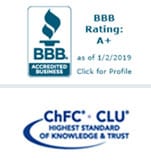Donor-advised funds are a form of charitable giving rapidly rising in popularity. According to the National Philanthropic Trust, 2020 marked over 1 million active accounts, with contributions towards said accounts making up 10.1% of giving that year. The act of donating to a good cause may speak for itself, but it’s only natural to wonder: why are so many people choosing donor-advised funds as their vessel for doing so?
As it turns out, there are multiple answers to that question! From flexibility, to low costs, to even tax benefits, read on to learn why you should consider adding a donor-advised fund to your financial strategy:
Flexibility
There are a few general consistencies among donor-advised funds: assets put into them cannot be withdrawn by their account holder and can only be taken out to be given to an IRS approved nonprofit organization. Also, true to their name, you don’t have direct control of your donor-advised fund, but rather act as an advising authority suggesting where you want your contributions to go. With such factors to consider, it may seem like donor-advised funds may not be that flexible after all.
However, operators of donor-advised funds have created measures to ensure that the money put into your account goes to causes you care about. One way this happens is through choosing one of three types of accounts: community, national, and mission-driven funds. If you want to give back to your local area, you can open a fund of the first type, while the second will spread more broadly, both in purpose and territory. Mission-driven funds hone in on a singular topic, such as an educational institution or faith. Selecting a type closest to your altruistic sensibilities will help you get the most out of your contributions.
And while there are restrictions on donor-advised funds, they also share certain freedoms as well. Take, for example, the ability to donate anonymously, an ability not permitted by other popular charitable vehicles like private foundations. In fact, donor-advised funds have many advantages over private foundations in particular, which brings us to our next point:
Low Costs
While private foundations can cost millions of dollars to get started, donor-advised funds are a charitable method accessible to those of almost any means. A typical minimum starting balance is around $1,000 to $5,000 – a drop in the bucket comparatively. In fact, as the popularity of donor-advised funds has increased, more options have become available that wave an initial investment entirely. You can put in as little or as much as fits your budgetary ability.
Beyond initial costs, there’s also no need for concern about the long-term expenses of opening a donor-advised fund: management fees are minimal, and should your account investments be fruitful, you don’t need to worry about being taxed the difference. All in all, donor-advised funds allow you to maximize the potential of your charitable contributions, with little money spent elsewhere.
Tax Benefits
In fact, you may even save money if you decide to open a donor-advised fund! Similar to a QCD, donor-advised funds allow you to mix tax benefits with charitable giving. However, unlike QCDs, there are no age restrictions or retirement accounts involved. Instead, you can deduct up to 60% of your adjusted gross income, or AGI, from cash contributions to a donor-advised fund. You can also contribute non-cash assets as well, such as crypto, stocks, or even art, for up to a 30% AGI deduction.
While there are no yearly withdrawal requirements for donor-advised funds, the tax benefits you receive are immediate. That means you can qualify for tax deductions as soon as your contribution enters your account, but it can stay in the fund for as long as you and your administrators like. Allow your contributions to grow in value and maximize the size of your charitable donations, while saving on taxes right away – an ideal situation for everyone involved!
Donor-advised funds can be managed by a foundation, a nonprofit organization or for the most options, choose a financial institution like Fidelity, Schwab, etc. If you think a Donor Advised Fund may be a good fit for you and you want to know more about the Tax Benefits, make sure you call or meet with someone at Cowen Tax Advisory Group. With over four decades of tax planning experience, we can help you get the most out of your charitable contributions. Schedule a free consultation today!
Lindsey Restelli
lindsey@cowentaxgroup.com
As Cowen Tax Advisory Group’s Digital Marketing Assistant, Lindsey provides in-house copywriting and manages the company’s electronic records system, email marketing, and blog.





